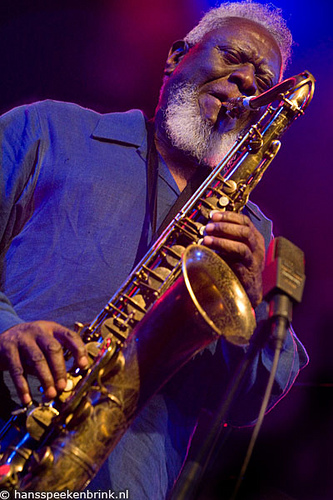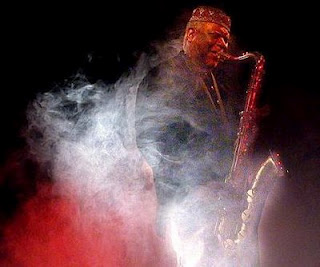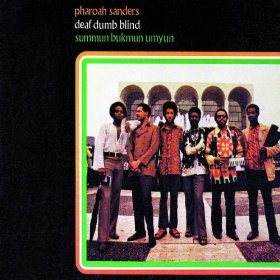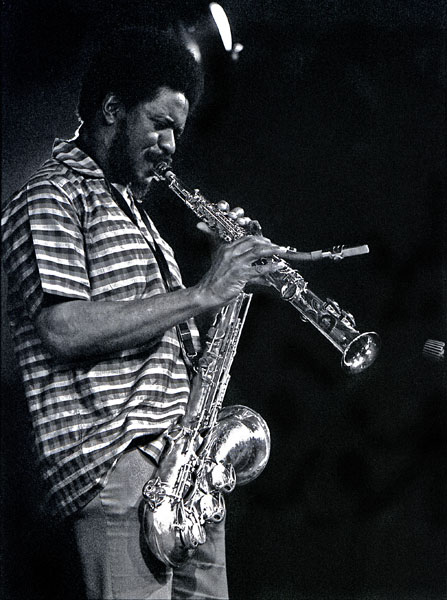PHAROAH SANDERS / Let Us Go Mixtape

After Trane, Pharoah Sanders was the tenor saxophonist who most startled me, made me rethink the sound of the saxophone and re-appreciate what could be done with the horn. Trane, of course, was the brightest light in the constellation of sounds I knew as jazz. There were many others whom I liked but none of them were a North Star, a guide to what was possible, to where we could go when we were free to go wherever we wanted to go, wherever we were capable of going; or, as we said critiquing our own limitations: we can do anything we want, the problem is can we want to do anything, do everything.
What do we really want our music to do? What do we want our lives to be? What are our wants? Pharoah is quoted in the liner notes to a Trane CD (I believe a reissue of Live In Seattle), “I was interested in other ways of playing than working on the chords”, or something like that. Other ways. That was Pharoah. So when I heard Pharoah solo on Trane’s Meditation release, I said, whoahhh, he’s cutting Trane. I was merely reacting to the sound of Pharoah on one solo, not the full sweep of the music as composition, which was Trane’s genius. Jazz of that era was a team music and sometimes the game was won by a particularly strong contribution from someone other than the nominal leader. To be clear, I had heard Shepp and Albert Ayler on records (and I realize that only knowing their music from records is a severe limitation), but neither of them grabbed me the way Trane, and later Pharoah did. I had to work too hard to fully appreciate Shepp, and I remember finding Ayler’s music too narrow a bandwidth; much of Albert sounded the same to me with limited variations: either fast and shrieking, or slow and tremulous; honks or exaggerated vibrato—that assessment says more about my ears than about Shepp and Ayler’s music, but that’s what I heard and didn’t hear. So after the Trane left the station, I hopped aboard Pharoah’s express, and was blessed to be able to hear him live, many, many times over the years. One thing that really struck me was that even among my favorite Pharoah recordings (Karma, Live At The East, Thembi), none of them fully captured the intensity and emotional power of Pharoah live. Yes, Live At The East, came close but even it seemed tame compared to what one experienced in the throes of a live Pharoah Sanders concert. I had heard the story of how one of Sander’s recordings was an un-intended second take because the first take so completely confounded the recording engineers that they botched the original session and had to request that the musicians repeat the long track again so that it could be properly captured on tape. Surely, most of us are aware that improvised music in general, and Pharoah’s music of the seventies in particular, could never be repeated. Like Dolphy said: once it’s played, it’s gone. Capturing that gone-ness is the holy grail of jazz engineering, for the most part we get tin cups, occasionally a clean glass, rarely a crystal goblet, especially with something both so volatile and simultaneously so ephemeral as a Pharoah Sanders set. When Deaf, Dumb and Blind (recorded July 1, 1970 in New York City) was first issued I marveled at the quarter hour take of “Let Us Go Into The House Of The Lord.” I was struck by the serious, shimmering beauty of the music, especially Cecil McBee’s singing arco bass solo. I thought that one track among the best of Pharoah’s recorded work. Because I am unrelenting in seeking high quality jazz from the Trane and immediate post-Trane eras, over the years I have acquired a clutch of bootlegs from that period. Among the finds is a tape from a French broadcast of a concert (July 18, 1971) by Pharoah’s quintet featuring “Let Us Go Into The House Of The Lord.” The audio quality is a bit dodgy in some parts, almost like we are listening to a cosmic broadcast and there is satellite interference at certain moments sounding sort of but not quite like static. But the music, oh, the music is heavenly including moments of intensity that can only be described as orgasmic—literal screaming and hollering and holy rolling in the throes of a release so momentous at it’s peak that all one can do is make impassioned sounds because there are no words for this feeling.
 O1 Deaf, Dumb, Blind
O1 Deaf, Dumb, Blind

This entry was posted on Sunday, January 29th, 2012 at 11:47 pm and is filed under Classic. You can follow any responses to this entry through the RSS 2.0 feed. You can leave a response, or trackback from your own site.
3 Responses to “PHAROAH SANDERS / Let Us Go Mixtape”
January 30th, 2012 at 8:25 pm
Too Deep for words…..Otherworldly Beautiful. Meeting Him and kissing His hand was the highlight of my 2011. He is the last of the Great Prophets.
Blessed Be the Spirit of Brother Pharaoh.
January 31st, 2012 at 10:15 am
kalamu,
who’s the drummer on the sets?
peace,
cherry
kalamu sez:
on the studio set it’s Anthony Wiles and and Nathaniel Bettis on percussion, Clifford Jarvis on drum set.
on the live recording it’s Lawrence Killian on percussion, Jimmy Hopps on drum set.
Leave a Reply
| top |